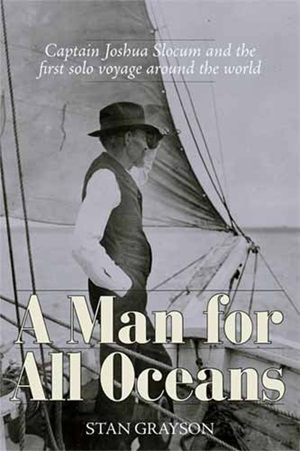Advertisement
Excerpt from Stan Grayson's book, A Man for All Oceans: Captain Joshua Slocum and the first solo voyage around the world.

It is also possible that Joshua Slocum no longer particularly cared about his boat's condition or even if the Spray remained seaworthy. The worst that could happen was that she would sink and end 24 years of loneliness and the disappointment he felt after a career that never amounted to what it should have. Despite his efforts to remain involved in life, Slocum may well have been the "lonely, unhappy man" that Vincent Gilpin perceived. It is possible that, at some fundamental level, his eternal optimism had deserted him and what lay ahead of him was mainly emptiness.
Still, Joshua Slocum remained a great sailor, and he had always been concerned about the safety and well-being of those who sailed with him. It would be distressing to think Slocum would have asked Lettie (Slocum's wife) to join him aboard a boat he knew to be unsafe, but given all the testimony of eyewitnesses who knew boats, and Slocum's possibly depressed emotional state, one can't entirely rule out such carelessness.
What was the event that ended Joshua Slocum's life? It is unlikely that the circumstances will ever be known. Victor Slocum's conjectures were no better, no worse, and little different than anybody else's:
Four things may have happened to the vessel and her skipper: Foundering in a gale, which is unlikely, as there was no seriously bad weather which that pair could not ride out to the sea anchor which was always ready: second, the possibility of fire, a hazard imminent on every vessel everywhere; third, collision at night; and last, shipwreck. Collision at night has always seemed to me the most likely of any of the things that may have happened.
Victor's brother, Ben Aymar, had a different take on the matter. He believed his father had ended his own life. In a March 4, 1954 letter to Walter Teller, Ben Aymar wrote, "I will always believe that father decided to join my mother — he could not live without her." In fact, it is not hard to imagine that the decline in the Spray's condition in later years was a reflection that Slocum no longer cared if the boat suffered a serious failure at sea.
Advertisement
Nine years after Victor's book was published, an article appeared in the Quincy Patriot Ledger that matched exactly Victor's guess about the reason for his father's loss, if not the location. "Solution of Sea Mystery Indicated In New Facts" was the story's headline. It was published on April 8, 1959, and carried the byline of Edward Rowe Snow.
Long before he became a Patriot Ledger columnist in 1957, Edward Rowe Snow was a widely celebrated historian who specialized in stories about maritime New England, pirates, and lighthouses. He had an undergraduate degree from Harvard and a master of arts degree from Boston university, and was well — known as "the Flying Santa" who delivered Christmas presents to New England lighthouse keepers — and sometimes keepers outside New England — and their families. That he copyrighted his story about Slocum is a measure of the seriousness in which he held the piece. He clearly believed what his source told him about Joshua Slocum. Snow's lead paragraph was as follows:
One of the world's greatest sea mysteries, the loss of the Spray, rivaling in importance the enigma of what happened to the ship’s company of the Mary Celeste in 1872 and the disappearance of the collier Cyclops in 1918, may have been solved yesterday at the offices of the Quincy Patriot Ledger by the disclosure that Capt. Joshua Slocum, who vanished at sea in 1909, may have been run down by a steamer of the Lesser Antilles within a relatively few hours after he had left the home of a farmer in the vicinity.
Snow named his source as Captain Charles H. Bond, "a master mariner whose background and references are such to make his statements unimpeachable."
Although Snow's article contains factual errors, and although he could have asked more questions of Captain Bond than he seems to have done, he did apparently take the time to check out Bond's veracity. Bond told Snow a story that he said was related to him by Felix Meinickheim, a onetime planter on Turtle Island. When Bond met Meinickheim, both men were living in New Jersey. Nobody involved in the story who might have been impacted by what Meinickheim revealed was still alive.
According to Meinickheim, Slocum had stayed at Turtle Island for a few days prior to departing for Venezuela's Orinoco River, which he planned to follow to the Rio Negro and the Amazon. In retrospect, it sounds like a dubious adventure concocted by someone with nothing better to do.
